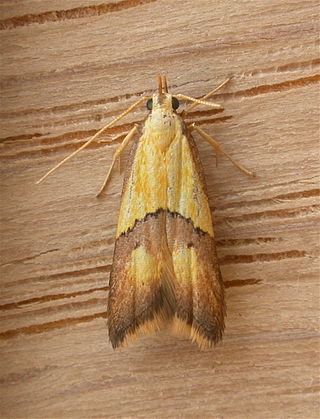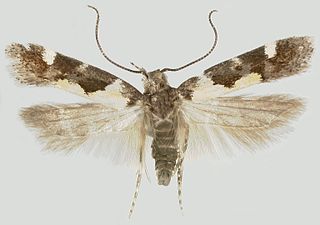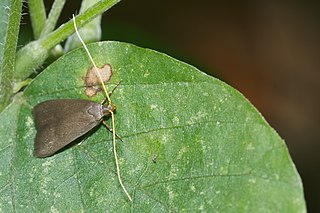
The Lecithoceridae, or long-horned moths, are a family of small moths described by Simon Le Marchand in 1947. Although lecithocerids are found throughout the world, the great majority are found in the Indomalayan realm and the southern part of the Palaearctic realm.

Crambinae is a large subfamily of the lepidopteran family Crambidae, the crambid snout moths. It currently includes over 1,800 species worldwide. The larvae are root feeders or stem borers, mostly on grasses. A few species are pests of sod grasses, maize, sugar cane, rice, and other Poaceae. The monophyly of this group is supported by the structure of the tympanal organs and the phallus attached medially to the juxta, as well as genetic analyses.

Anarsia is a genus of moths in the family Gelechiidae.

Ardozyga is a genus of moths in the family Gelechiidae.

Aristotelia is a genus of moths in the family Gelechiidae. Well-known species are food plant specialists, and diverse hosts are used – Salicaceae, Solanaceae, Rosaceae, Fagaceae, Fabaceae, Asteraceae.

Dichomeris is a genus of moths in the family Gelechiidae erected by Jacob Hübner in 1818.

Epiphthora is a genus of moths in the family Gelechiidae.

Hypatima is a genus of the twirler moth family (Gelechiidae). Among these, it belongs to a distinct lineage, which is variously treated as tribe Chelariini in subfamilies Dichomeridinae, Gelechiinae, or even Pexicopiinae, and historically was considered a subfamily in its own right, Chelariinae. Of this lineage, Hypatima – under its junior synonym Chelaria – is the type genus. This genus has numerous species, but its exact limits are not quite clear. This genus occurs mainly in the Southern Hemisphere, though one of the better-known species is the only member of this genus native to Europe, the lobster-clawed moth.

Stegasta is a genus of moths in the family Gelechiidae.

The Lecithocerinae are a subfamily of small moths in the family Lecithoceridae. They are found worldwide, but most species occur in South Asia. The subfamily is characterized by the male genitalia with a bridge-like structure connecting the tegumen and the valva, and the uncus almost always is vestigial with two lobes at the dorsal base, only exceptionally united into a broad plate, but never as a thorn or spine.

Scoparia is a grass moth genus of subfamily Scopariinae. Some authors have assigned the synonymous taxon Sineudonia to the snout moth family (Pyralidae), where all grass moths were once also included, but this seems to be in error.

Crocanthes is a genus of moths in the family Lecithoceridae.

Lecithocera is a genus of moths in the lecithocerid subfamily Lecithocerinae. The genus was erected by Gottlieb August Wilhelm Herrich-Schäffer in 1853.

Autosticha is a genus of gelechioid moths. It belongs to the subfamily Autostichinae, which is either placed in the concealer moth family (Oecophoridae), or in an expanded Autostichidae. It is the type genus of its subfamily. Originally, this genus was named Automola, but this name properly refers to a fly genus in family Richardiidae.
Sarisophora chlaenota is a moth in the family Lecithoceridae. It was described by Edward Meyrick in 1904. It is found in Australia, where it has been recorded from New South Wales.
Sarisophora cyclonitis is a moth in the family Lecithoceridae. It was described by Edward Meyrick in 1904. It is found in Australia, where it has been recorded from Queensland.
Sarisophora dactylisana is a moth in the family Lecithoceridae. It was described by Chun-Sheng Wu in 1994. It is found in China.
Sarisophora idonea is a moth in the family Lecithoceridae. It was described by Chun-Sheng Wu in 1994. It is found in China.













